Only one law (or a variation thereof) seems likely to increase individual freedom by forcing countries to compete for citizens:
1. Any permanent resident or citizen of Country X with at least 15 billion USD in goods and/or services sold annually in at least 1 of the past 7 yrs to Country Y shall be allowed to move to Country Y and automatically gain the same legal residency status as in Country X, including but not limited to permanent residency or citizenship, unless
a) s/he has a conviction for a violent crime involving physical injury in the past 30 yrs; or
b) Country X's population is fewer than 20 million and/or has a population density [defined as persons per sq km except for refugees] greater than 550 at time of application; AND
Furthermore, such legal residency exchange shall only be allowed two times in any individual's lifetime; AND
All applications under this statute shall be processed within 7 days of receipt by Country X; AND
Furthermore, any denial must be in writing with rationale and documents supporting denial included, along with right to appeal within 60 days and appear before independent tribunal.
2. To prevent currency manipulations circumventing this statute's intent, residents of Country X moving to Country Y shall be entitled to receive any exchange rate over the last 11 years posted at the close of business by any government-insured banking entity with at least 50 billion USD in deposits or assets. Amounts may not be adjusted for inflation.
Update: re: FOREX rates, I envision some restrictions to prevent gaming, such as "...except that if residents moving from Country X to Country Y do not reside at least 200 days a year in Country Y for at least three consecutive years, Country Y may exercise a one-time right to demand FOREX transaction difference between actual exchanged rates and current rates on date of return, but such right shall not be used to deny a resident the right to return to Country X; instead, the difference shall be registered in an international court's ledgers using blockchain verification and any amount in excess of 25 million USD shall be transferred from Country X's escrow account into Country Y's account."
1. Any permanent resident or citizen of Country X with at least 15 billion USD in goods and/or services sold annually in at least 1 of the past 7 yrs to Country Y shall be allowed to move to Country Y and automatically gain the same legal residency status as in Country X, including but not limited to permanent residency or citizenship, unless
a) s/he has a conviction for a violent crime involving physical injury in the past 30 yrs; or
b) Country X's population is fewer than 20 million and/or has a population density [defined as persons per sq km except for refugees] greater than 550 at time of application; AND
Furthermore, such legal residency exchange shall only be allowed two times in any individual's lifetime; AND
All applications under this statute shall be processed within 7 days of receipt by Country X; AND
Furthermore, any denial must be in writing with rationale and documents supporting denial included, along with right to appeal within 60 days and appear before independent tribunal.
2. To prevent currency manipulations circumventing this statute's intent, residents of Country X moving to Country Y shall be entitled to receive any exchange rate over the last 11 years posted at the close of business by any government-insured banking entity with at least 50 billion USD in deposits or assets. Amounts may not be adjusted for inflation.
Update: re: FOREX rates, I envision some restrictions to prevent gaming, such as "...except that if residents moving from Country X to Country Y do not reside at least 200 days a year in Country Y for at least three consecutive years, Country Y may exercise a one-time right to demand FOREX transaction difference between actual exchanged rates and current rates on date of return, but such right shall not be used to deny a resident the right to return to Country X; instead, the difference shall be registered in an international court's ledgers using blockchain verification and any amount in excess of 25 million USD shall be transferred from Country X's escrow account into Country Y's account."













